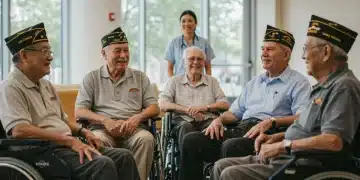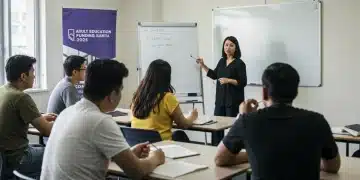Continuing education benefits for veterans

Continuing education benefits for veterans provide essential resources that enhance skills, facilitate networking, and promote personal development, enabling successful transitions to civilian careers.
Continuing education benefits for veterans can greatly enhance career prospects and personal growth. Have you considered how these opportunities can shape your future? Let’s dive into the details.
Understanding continuing education for veterans
Understanding the concept of continuing education for veterans is vital for those looking to enhance their skills and knowledge after military service. This type of education encompasses various programs aimed at improving career prospects and personal development.
What is Continuing Education?
Continuing education refers to a variety of learning opportunities designed for adults, particularly those who have completed their primary education. For veterans, these programs can bridge the gap between military experience and civilian job expectations.
Types of Programs Available
Veterans can choose from a range of continuing education programs. Here are some options:
- Vocational training
- Online courses
- Community college classes
- Workshops and seminars
Each option provides valuable skills that can enhance employability and personal growth.
Moreover, many institutions tailor their programs to fit the unique experiences of veterans. This personalized approach helps veterans transition smoothly into the civilian workforce. For example, apprenticeships may combine hands-on training with classroom learning, allowing veterans to earn while they learn.
Additionally, understanding the available resources is crucial. The U.S. Department of Veterans Affairs (VA) offers various educational benefits to support veterans. These include the GI Bill and tuition assistance programs, which can significantly cover the costs of education.
Benefits of Continuing Education
Engaging in continuing education helps veterans not only in career advancement but also in personal fulfillment. The benefits include:
- Improved job prospects
- Increased earning potential
- Expanded professional network
- Personal growth and development
As veterans explore these educational opportunities, they can empower themselves to pursue new career paths.
Financial assistance programs available
Financial assistance programs available to veterans can significantly lighten the burden of education costs. These programs enable veterans to pursue their goals without the stress of financial constraints.
Types of Financial Assistance
There are several types of financial aid that veterans can access. Here are some key options:
- GI Bill: This is one of the most recognized programs, covering tuition fees and housing expenses.
- Vocational Rehabilitation and Employment (VR&E): This program assists veterans with service-connected disabilities to prepare for, find, and maintain suitable employment.
- Tuition Assistance (TA): Many military branches offer TA programs to pay for college courses.
- Scholarships: Numerous organizations provide scholarships specifically for veterans, supporting diverse fields of study.
These financial aids can cover various expenses, including tuition, books, and fees, making it easier for veterans to focus on their studies.
Additionally, applying for these programs can be straightforward. Veterans often need to complete specific forms and provide documentation of their service. It’s essential to research each program’s eligibility requirements, as they can vary by state and institution.
Benefits of Financial Assistance
Utilizing financial assistance can lead to numerous benefits. Not only does it reduce the financial burden, but it also allows veterans to:
- Focus entirely on their education and goals
- Minimize student loan debt
- Explore a wide range of career options
- Gain confidence in their ability to succeed academically
By taking advantage of these resources, veterans can pave the way for a successful transition into civilian life while furthering their education and skills.
Transitioning to civilian careers

Transitioning to civilian careers can be a significant step for veterans. This shift presents unique challenges and opportunities that can shape their future.
Understanding the Transition
The process of moving from military to civilian work involves understanding both the skills gained during service and the expectations of civilian employers. Many veterans possess valuable skills, such as leadership, teamwork, and discipline, that are highly sought after in the workforce.
Identifying Transferable Skills
Veterans should focus on identifying their transferable skills, which are abilities that apply to various jobs. These include:
- Leadership: Managing teams and guiding others, a vital skill in any workplace.
- Problem-Solving: The ability to analyze situations and develop effective solutions.
- Adaptability: Adjusting to new environments and challenges quickly.
- Technical Skills: Experience with various technologies gained during service.
Recognizing these skills can help veterans in their job search, allowing them to present themselves confidently to employers.
In addition to identifying skills, veterans may benefit from various resources designed to aid their transition. Programs that focus on resume writing, interviewing, and networking can be incredibly helpful. Many organizations offer workshops and support tailored specifically for veterans.
Networking and Job Search Strategies
Building a professional network is crucial for finding job opportunities. Veterans can connect with other former service members, attend job fairs, and utilize online platforms to expand their contacts. They should also explore organizations that specialize in veteran employment, as these can provide potential job leads and connections.
When searching for jobs, veterans should be proactive and open-minded. This includes considering various industries that value military experience. Many veterans find fulfilling careers in fields such as healthcare, logistics, and information technology, where their skills can be effectively utilized.
Networking opportunities through education
Networking opportunities through education are vital for veterans who are transitioning to civilian life. These connections can open doors to new job prospects and valuable resources.
The Importance of Networking
Networking allows veterans to build relationships with professionals in their desired fields. By attending educational events, veterans can meet industry leaders and peers who can provide guidance and support. This interaction can lead to job referrals and mentorship.
Ways to Network Through Education
Veterans can explore various avenues to enhance their networking skills. Here are some effective strategies:
- Join Professional Organizations: Becoming a member of industry-specific groups can expand your network.
- Attend Workshops and Seminars: These events offer a great platform to connect with others and learn.
- Participate in Online Courses: Online learning platforms often have forums for discussion, where you can engage with classmates.
- Use Social Media: Sites like LinkedIn can help you connect with professionals in your field.
These methods encourage interaction and collaboration, paving the way for fruitful relationships.
Additionally, educational institutions often provide networking events for students. These events might include career fairs, guest lectures, and networking nights where veterans can connect with potential employers. Such experiences not only build confidence but also enhance communication skills.
Building Lasting Connections
Networking is not just about immediate job leads; it’s about building lasting connections. By engaging with a network, veterans can receive ongoing support and advice throughout their careers. Staying in touch with contacts through regular communication can lead to future opportunities.
Utilizing educational settings as a networking platform can significantly benefit veterans in their long-term career planning. Networking through education creates a sense of community and offers valuable insights that can help veterans navigate their careers successfully.
Personal development and lifelong learning
Personal development and lifelong learning are essential aspects of growth for veterans after their military service. Engaging in educational activities not only enhances skills but also boosts confidence and adaptability in various environments.
Understanding Personal Development
Personal development involves a continuous process of self-improvement and learning. For veterans, this can mean exploring new interests, setting goals, and developing new skills that may have been less emphasized during their service. By focusing on personal growth, veterans can find new passions and greater fulfillment.
Benefits of Lifelong Learning
Lifelong learning encourages individuals to keep acquiring knowledge and skills throughout their lives. Here are some key benefits:
- Enhanced Adaptability: Learning new things helps veterans adapt to changing environments and job markets.
- Increased Earning Potential: Continuing education can lead to better job opportunities and higher salaries.
- Improved Mental Health: Engaging in learning activities keeps the mind active and can reduce stress.
- Broader Perspectives: Learning from diverse subjects increases understanding of different cultures and ideas.
Veterans can utilize various resources for lifelong learning. Online courses, community colleges, and local workshops provide opportunities for skill-building. With technology, veterans can access learning materials from anywhere, allowing them to study at their own pace.
Moreover, joining groups or clubs related to personal interests can foster connections and provide mutual support among peers. This interaction not only enhances learning but also builds a sense of community.
Setting Personal Development Goals
When considering personal development, setting clear and achievable goals is vital. Veterans can start by identifying areas they want to improve or explore. Whether it’s pursuing a new career, improving physical fitness, or learning a new language, having specific goals can help guide their efforts effectively.
By investing time and effort into personal development and lifelong learning, veterans can create fulfilling lives and navigate their post-service paths with confidence.
In conclusion, personal development and lifelong learning are crucial for veterans transitioning to civilian life. By embracing these concepts, veterans can enhance their skills, adapt to new challenges, and improve their overall well-being. Networking opportunities, educational resources, and clear goal-setting further support their journey. With determination and the right tools, veterans can lead fulfilling, successful lives after service.
FAQ – Frequently Asked Questions about Personal Development and Lifelong Learning for Veterans
What is personal development for veterans?
Personal development for veterans involves continuous self-improvement through learning new skills, setting goals, and exploring interests after military service.
How can lifelong learning benefit veterans?
Lifelong learning helps veterans enhance their adaptability, increase their earning potential, and improve their mental health while keeping their minds active.
What networking opportunities are available for veterans?
Veterans can network through professional organizations, education workshops, and online platforms to connect with industry professionals and peers.
How can veterans set achievable personal development goals?
Veterans can set achievable goals by identifying areas they want to improve or explore and creating a clear plan to guide their learning and development.





